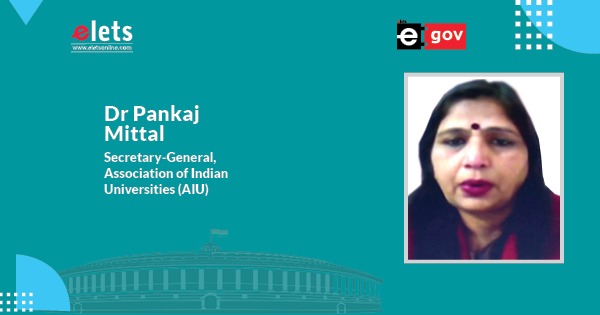
COVID has changed lives altogether. The new normal exists not only in India but all over the world. And in such times, National Education Policy was also launched in India.” – This was stated by Dr. (Mrs) Pankaj Mittal, Secretary-General, Association of Indian Universities (AIU) who was delivering an address at the 22nd World Education Summit, organized by Elets Technomedia at New Delhi recently.
Dr. Mittal spoke on how technology changed the education scenario of India. “When the COVID struck and all the universities and colleges were closed, our students and teachers were not used to online education. But then I realized that if anyone has to be given the best teacher award in 2020, it should be given to COVID-19. Due to the pandemic, teachers and students started using technology to a large extent. The online platforms, the blended mode of learning and using technology for teaching-learning escalated like anything,” Mittal said.
In the virtual address Dr. Pankaj also mentioned that “I am from UGC. We have been trying to use technology from the last 5 to 6 years. But with covid, it became the need of the hour. The pandemic taught everybody how to go online, how to teach online, how to learn online, how to collaborate online, how to do internships online, how to do placements online. A large part of the curriculum should consist of technology, not only how to use the technology, but also how to learn using this technology.”

She further elaborated on how NEP has brought a lot of changes in the education system. “It is very important that our students should learn technology. They should be learning about the latest advancements in technology, whether it is artificial intelligence, IoT, robotics, drones, virtual reality or augmented reality or even space tourism, they are going to be the new thing in the future. So, wherever the new jobs would be existing, say in 2030, that has to be taught in the institution and that is being advocated by the National Education Policy,” Mittal said
Dr. Mittal also highlighted the new concept of blanket education. “Here you give audio videos text to the students in advance. Students will study at home and in the class only things like discussions, understanding, reasoning will happen and rationale will be developed. In India, students study in class and revise at home but abroad, students study at home and then come to the class. This is the flipped classroom model. It is very important that teachers should know how to prepare their own e-content, which means their own videos or audios or text whatever they want to give, or they should know where to find the e-content.”

Dr. Pankaj also mentioned the need for proper assessment and evaluation of students for better results. “We could not hold online examinations because our students were not trained to do that, also there was an issue of digital divide because India is a diverse country. And everybody doesn’t have access to not only network and bandwidth, but also electricity and computers. The policy recommends that the assessment should be a continuous assessment throughout the semester. It should be based on multiple ways. It could be activities, assignments, face-to-face interviews, projects or a group discussion. So there are multiple ways of assessing the student. Assessing has completely changed post covid.”
Concluding the address Dr. Pankaj said, “National education policy has the potential to make India ‘Vishwa guru’ once again. The only condition is that we should implement the NEP in spirit with a lot of passion. Dr. Zakir Hussain, when he was laying down the foundation of Jamia Millia Islamia, said that to build any institution desire is very important. Desires include passion of the student, teachers,vice-chancellors, principals, leaders and registrars. If the passion exists in everyone, nobody can stop from getting NEP implemented in letter and spirit. And nobody can stop India from become a Vishwa guru once again,” she said.
Be a part of Elets Collaborative Initiatives. Join Us for Upcoming Events and explore business opportunities. Like us on Facebook , connect with us on LinkedIn and follow us on Twitter, Instagram.











